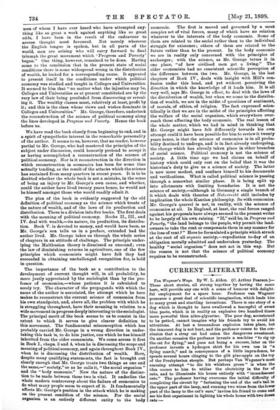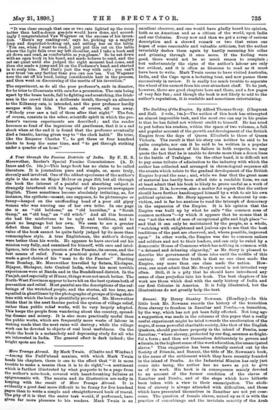CURRENT LITERATURE.
Van Wagener's Ways. By W. L. Alden. (C. Arthur Pearson.)— These short stories, all strung together by having the same hero, will provide any one with a sense of humour with delight- ful employment for a spare hour. Professor van Wagener possesses a great deal of scientific imagination, which leads him to many great and startling inventions. There is one story of a dog which is thought to have swallowed a teacupful of sweet blue paste, which is in reality an explosive two hundred times more powerful than nitro-glycerine. The poor dog, accustomed to be petted, cannot imagine why his friends try to avoid his attentions. At last a tremendous explosion takes place, but the innocent dog is not hurt, and the professor comes to the con- clusion that a stray cat had eaten the dangerous sweatmeat. On another occasion the professor invents a machine "to rig up the cat for flying," and puss not being a success, later on the professor invents a hydrogen shirt for his own use in "a flying march," and in consequence of a little imprudence, he spends several hours clinging to the gilt pine-apple on the top of the Presbyterian steeple. But perhaps Van Wagener's most amusing attempt "to die his whiskers green" is when the idea occurs to him to utilise the electricity in the fur of cats, and to illuminate his house entirely with " incandescent cats." The professor having overcome the initial difficulty of completing the circuit by " fastening the end of the cat's tail in the upper part of the lamp, and running two wires from the lower part of the lamp to the cat's ears," invites his friend to come and see his first experiment in lighting his whole house with two dozen cats
"It was clear enough that one or two cats lighted up the room better than half-a-dozen gas-jets would have done, and accord- ingly I congratulated Van Wagener on the success of his inven- tion. Here's my reading-cat,' says he, picking up a mighty limp and dispirited-looking cat, and setting her on the table. ' You see, when I want to read, I just put this cat on the table where the light falls over my left shoulder, and I take a book and sit down and read, as comfortable as you please.' So he sat down with an open book in his hand, and made believe to read, and the cat sat quiet until she judged the right moment had come, and then she made a jump and lit on the Professor's head, and started in to scalp him. But that's just the way with cats : you can't ever trust 'em any farther than you can see 'em. Van Wagener tore the cat off his head, losing considerable hair in the process, and then went on discoursing of the merits of his invention."
The experiment, as do all the poor professor's, ends in disaster, for he tries to illuminate with cats for a procession. The cats being upset by the brass bands, fall to fighting and scratching, the Irish- men in the crowd think a deliberate insult, through an allusion to the Kilkenny cats, is intended, and the poor professor hardly escapes with his life. The cats, of course, all run away. "Nobody ever saw a tail of them after that night." The fun, of course, consists in the sober, scientific spirit in which the pro- fessor's various experiments are described ; and the reader becomes so fond of the ingenious old gentleman, that it is a sad shock when at the end it is found that the professor eventually died a lunatic, having given way to " the clock habit." He tries, like the Emperor Charles V., to get three or four hundred clocks to keep the same time, and " to get through striking under a quarter of an hour."



































 Previous page
Previous page